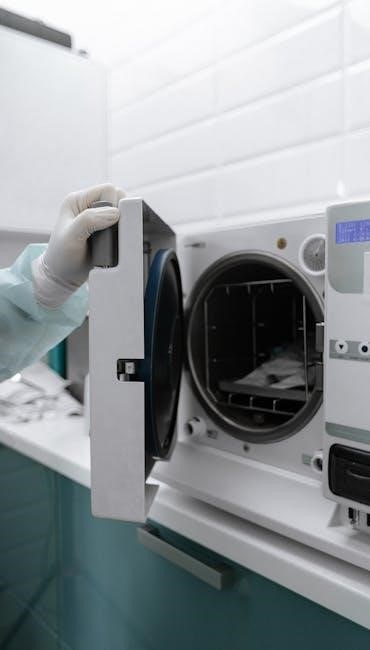Kindergarten science worksheets introduce young learners to fundamental concepts through engaging activities, fostering curiosity and early STEM skills, all while being easily accessible as free PDF downloads online.

1.1 Importance of Science Education in Kindergarten
Science education in kindergarten lays the foundation for critical thinking, curiosity, and creativity. It introduces young learners to basic concepts like animals, plants, and the environment, fostering a love for discovery. Early exposure to science helps children develop observation and exploration skills, essential for future academic success. By incorporating hands-on activities and interactive worksheets, kindergarten science education promotes problem-solving and creativity. It also builds a strong base for STEM subjects, encouraging children to ask questions and seek answers. Free PDF worksheets make these learning opportunities accessible and engaging for young minds.
1.2 Benefits of Using Worksheets for Early Learning
Worksheets offer a structured way to introduce young learners to science concepts, promoting visual and tactile engagement. They provide a clear format for practicing skills, reinforcing lessons, and tracking progress. Kindergarten science worksheets, especially in PDF format, are easily accessible and printable, making them a convenient resource for teachers and parents. They also encourage fine motor skills and hand-eye coordination through activities like coloring and tracing. Free downloads ensure affordability, while the variety of topics keeps learning exciting and tailored to different interests. Worksheets are a valuable tool for fostering early STEM exploration and foundational knowledge.

Finding Free Kindergarten Science Worksheets Online
Finding free kindergarten science worksheets online is convenient and educational. Websites like Teachers Pay Teachers and Education.com offer diverse, fun, and printable PDF resources for parents and educators.

2.1 Popular Websites for Free Educational Resources
Websites like Teachers Pay Teachers, Education.com, and ABCmouse offer a wide range of free kindergarten science worksheets in PDF format. These platforms cater to educators and parents, providing engaging activities on topics like animals, plants, and basic physics. Many resources are designed to align with curriculum standards, ensuring educational value. Additionally, sites like Worksheet Genius and Khan Academy Kids offer interactive and printable materials to support early learning. These websites are trusted for their quality and accessibility, making it easy to download and use science worksheets tailored for young learners.
2.2 Using Search Engines Effectively
To find kindergarten science worksheets, use specific keywords like “kindergarten science worksheets PDF free download” in search engines. Enclose phrases in quotes for exact matches, such as “free printable science worksheets for kindergarten.” Utilize Boolean operators like AND (e.g., “kindergarten AND science AND worksheets”) to refine results. Explore advanced search options to filter by file type (PDF) or date. Additionally, employ site operators to search within educational domains, such as “site:education.com kindergarten science worksheets.” These strategies help locate relevant resources efficiently and ensure quick access to high-quality, free downloadable materials.
2.3 Boolean Operators for Targeted Searches
Boolean operators enhance search efficiency for kindergarten science worksheets. Use AND to combine terms, e.g., “kindergarten AND science AND worksheets,” ensuring all keywords appear. Apply OR to broaden results, like “free OR printable OR downloadable,” to find varied resources. Quotation marks (” “) enforce exact phrases, such as “kindergarten science PDF.” Exclude unwanted terms with NOT, e.g., “kindergarten science worksheets NOT coloring.” These operators refine searches, yielding precise and relevant results for free downloadable PDFs, saving time and effort in finding ideal educational materials.

Downloading and Organizing Worksheets
Downloading and organizing kindergarten science worksheets involves selecting PDF files, saving them to designated folders, and categorizing by topics or grade levels for easy access and retrieval.
3.1 Steps to Download PDF Worksheets
To download kindergarten science worksheets, start by searching for “kindergarten science worksheets PDF free download” on popular educational websites. Use specific keywords and Boolean operators like AND or OR to refine your search. Once you find a suitable worksheet, click the download link, usually labeled as Download or Print. Save the file to a designated folder on your device, such as “Kindergarten Worksheets” or “Science Activities.” Ensure the file is in PDF format for easy printing and sharing. After downloading, organize the worksheets by topic or grade level for quick access and efficient lesson planning. Always verify the source for safety and quality.
3.2 Organizing Worksheets by Topic or Grade Level
Organizing kindergarten science worksheets by topic or grade level ensures easy access and effective lesson planning. Create digital folders labeled by subjects like Animals, Plants, or Physics. Within each folder, categorize worksheets by specific themes, such as Habitats or Life Cycles. For grade-level organization, separate folders for Pre-K and Kindergarten help tailor activities to students’ developmental stages. Use clear naming conventions, like Animals_Habitats_Worksheet1.pdf, to quickly identify each file. Regularly review and update your system to maintain order and efficiency, ensuring resources remain relevant and accessible for future use. This methodical approach enhances teaching and learning experiences.

Topics Covered in Kindergarten Science Worksheets
Kindergarten science worksheets explore foundational topics like animals, plants, basic physics, and space, introducing young learners to the natural world through engaging and educational activities.
4.1 Animals and Their Habitats
Kindergarten science worksheets on animals and their habitats introduce young learners to the diversity of wildlife and ecosystems. These worksheets often feature activities like matching games, coloring pages, and simple quizzes to help children recognize different animals and their environments. Topics include forest creatures, ocean animals, and farm animals, teaching kids about adaptation and coexistence. Interactive elements, such as labeling diagrams of habitats, encourage hands-on learning. Visual aids like pictures and charts make complex concepts accessible, fostering curiosity and a love for nature. These activities also promote early skills in classification and environmental awareness.
4.2 Plants and Their Life Cycle
Kindergarten science worksheets on plants and their life cycles help young learners explore the growth and development of plants. These worksheets often include activities like coloring diagrams of plant parts, sequencing the stages of seed germination, and labeling the life cycle of plants like sunflowers or beans. Interactive elements, such as matching games and simple quizzes, reinforce concepts like photosynthesis and the importance of plants in our ecosystem. Visual aids like pictures of seeds, sprouts, and flowers make learning engaging. By introducing basic botany, these worksheets lay the foundation for understanding nature and environmental concepts, while fostering curiosity and a love for gardening.
4.3 Basic Physics and Motion
Kindergarten science worksheets on basic physics and motion introduce young learners to fundamental concepts like push, pull, and movement. Activities include matching objects with their movements, such as cars rolling or balls bouncing, and sorting items by whether they can fly or float. Simple experiments, like drawing paths for rolling balls, encourage hands-on exploration. These worksheets help children understand cause-and-effect relationships and the basics of energy transfer, fostering an early interest in how things move and interact. They also incorporate fun visuals to make learning about motion engaging and accessible for young minds.

Creating Custom Science Worksheets
Custom kindergarten science worksheets allow teachers to tailor activities to specific learning goals, incorporating visuals and interactive elements to make learning engaging and effective.
5.1 Designing Worksheets for Specific Learning Goals
Designing custom science worksheets for kindergarten involves aligning activities with specific learning objectives, such as understanding animal habitats or plant life cycles. By incorporating clear instructions and age-appropriate visuals, teachers can ensure that young learners grasp key concepts effectively. Worksheets should also include interactive elements, like matching games or coloring sections, to make learning engaging. Assessments can be embedded through simple observational checklists or short-answer questions to track progress. This tailored approach ensures that each worksheet addresses developmental milestones while fostering curiosity and scientific thinking in young students.
5.2 Incorporating Visuals and Interactive Elements
Incorporating visuals and interactive elements into kindergarten science worksheets enhances engagement and understanding. High-quality images, diagrams, and illustrations help young learners grasp complex concepts visually. Interactive elements, such as puzzles, matching games, and “true or false” questions, encourage hands-on participation. These features make learning fun and dynamic, keeping children focused and motivated. Worksheets with interactive components also allow for immediate feedback, helping teachers assess comprehension. By combining visuals with activities, educators create a stimulating environment that fosters curiosity and lays a strong foundation for future science exploration. This approach ensures learning is both effective and enjoyable for young students.

Tips for Using Worksheets Effectively

To maximize learning, encourage hands-on activities alongside worksheets, ensuring children stay engaged and motivated. Balance structured tasks with creative play to foster a love for science exploration.
6.1 Encouraging Hands-On Learning
Hands-on learning is essential for kindergarten science education, as it allows children to explore and understand concepts through direct experience. Worksheets can serve as a complement to practical activities, such as experiments or observations. For example, after completing a worksheet about plants, children can plant seeds and observe their growth. This combination of visual and tactile learning enhances retention and makes science more engaging. Parents and teachers should integrate worksheets with real-world experiments to create a balanced and interactive learning environment. This approach fosters curiosity and builds a strong foundation for future scientific inquiry.

6.2 Making Science Fun and Engaging
Science becomes captivating for kindergartners when lessons are infused with creativity and interactivity. Worksheets can include colorful visuals, puzzles, and simple experiments to spark curiosity. Incorporating games, such as matching animal habitats or sorting plant parts, makes learning playful. Interactive elements like “draw and label” activities encourage creativity while reinforcing concepts. Parents and teachers can also use storytelling or role-playing to bring science to life. By blending structured worksheets with dynamic activities, children develop a love for science that extends beyond the classroom, fostering a lifelong passion for discovery and exploration.
Kindergarten science worksheets are invaluable tools for introducing young minds to essential scientific concepts. They foster curiosity, creativity, and early STEM skills, making learning fun and accessible for all.
7.1 Summary of Key Points
Kindergarten science worksheets are essential for early learning, offering a structured way to explore topics like animals, plants, and basic physics. They are widely available as free PDF downloads, making them accessible to educators and parents. These worksheets help develop critical thinking and problem-solving skills while fostering a love for science. Utilizing these resources effectively can enhance classroom activities and home learning, ensuring a strong foundation for future academic success.
7.2 Final Thoughts on Enhancing Science Education
Incorporating kindergarten science worksheets into daily learning routines can significantly enhance early science education. These resources, available as free PDF downloads, provide engaging and interactive ways to introduce young minds to scientific concepts. By leveraging these tools, educators and parents can foster curiosity, creativity, and a strong foundation for future STEM exploration. Emphasizing hands-on activities and making science fun ensures that children develop a lifelong love for learning and discovery. These worksheets are a valuable asset in creating a nurturing and enriching educational environment.